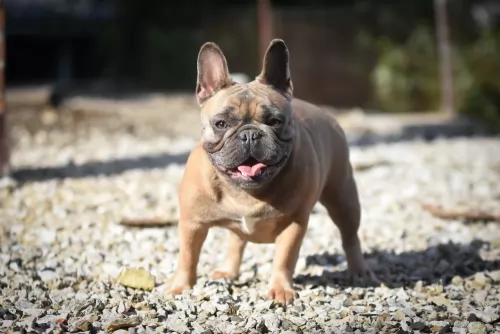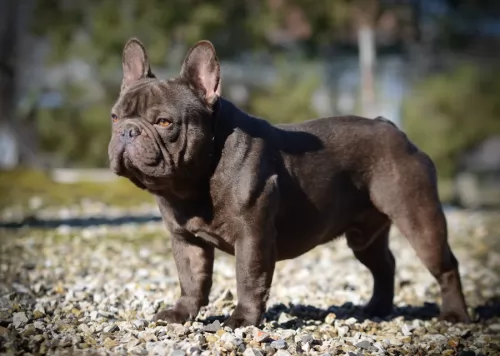 Petzlover
Petzlover French Bulldog is originated from France but Spanish Pointer is originated from Spain. French Bulldog may grow 32 cm / 12 inches shorter than Spanish Pointer. French Bulldog may weigh 16 kg / 35 pounds lesser than Spanish Pointer. French Bulldog may live 3 years less than Spanish Pointer. Both French Bulldog and Spanish Pointer has almost same litter size. Both French Bulldog and Spanish Pointer requires Low Maintenance.
French Bulldog is originated from France but Spanish Pointer is originated from Spain. French Bulldog may grow 32 cm / 12 inches shorter than Spanish Pointer. French Bulldog may weigh 16 kg / 35 pounds lesser than Spanish Pointer. French Bulldog may live 3 years less than Spanish Pointer. Both French Bulldog and Spanish Pointer has almost same litter size. Both French Bulldog and Spanish Pointer requires Low Maintenance.
 The french bulldog originated in England and are bred expecting small size bulldogs. Many lace workers in Nottingham had little bulldogs and when they emigrated to france, they brought their dogs with them. Soon they become popular in France and Europe. Then Americans showed interest in them.In 1896 frenchie was shown in United states in a show and after that they got their nickname "Frechie".
The french bulldog originated in England and are bred expecting small size bulldogs. Many lace workers in Nottingham had little bulldogs and when they emigrated to france, they brought their dogs with them. Soon they become popular in France and Europe. Then Americans showed interest in them.In 1896 frenchie was shown in United states in a show and after that they got their nickname "Frechie".
 The Spanish Pointer is a large hunting breed. The dog hails from Spain and it is believed that the dog was used to develop other pointing breeds.
The Spanish Pointer is a large hunting breed. The dog hails from Spain and it is believed that the dog was used to develop other pointing breeds.
It is popular in Spain but fairly unknown beyond Spanish borders. Known as the Burgos Pointer, the official name for the dog is Perdiguero de Burgos.
It is thought that the dog comes from mixing the Pachon Navarra and the Sabueso Espanol. The dog was developed to point out game so they have the typical longish head with the pointing tail.
 Frenchie is a good companion dog and has a powerful muscular body. They like to play but also likes to relax for more time. They are intelligent and training them is very easy until they think it a game. They are free thinkers and are not very good in obedience. Frenchies should not be leaved alone for a long time.They love spending time with humans and generally they get along with everyone. They are excellent watchdogs and alerts when strangers come.
Frenchie is a good companion dog and has a powerful muscular body. They like to play but also likes to relax for more time. They are intelligent and training them is very easy until they think it a game. They are free thinkers and are not very good in obedience. Frenchies should not be leaved alone for a long time.They love spending time with humans and generally they get along with everyone. They are excellent watchdogs and alerts when strangers come.
French bulldog suits very well in apartments. But they should be made to walk for fifteen minutes daily to avoid over weight. They should not be kept outside on hot days. Frenchies will be very happy if you stay in home. They will follow you wherever you walk inside the house. They love people so much, such that people who own a Frenchie can not imagine life without them.
 The body of this dog is true to the Pointer type of dog with the body being muscular and lean.
The body of this dog is true to the Pointer type of dog with the body being muscular and lean.
He stands at between 62 to 67cm in height and weighs about 25 to 30kg. The ears are quite long and floppy and the tail is usually docked to a third of its length.
The coat which is mostly short can be whitish with tan or brown markings with freckling or it can be a brownish shade with darker brown markings.
The Spanish Pointer is a quiet, calm, gentle dog and not at all aggressive. They’re able to get on well with children and other pets.
They’re dogs that love the great outdoors and aren’t suited to city living. They’re dogs that need a good deal of exercise too. Being intelligent the pointer dog will benefit from training and socialization.
 They are good children friendly dogs as they like to play with them. It will be good if they are supervised by an adult.
They are good children friendly dogs as they like to play with them. It will be good if they are supervised by an adult.
They are polite with everyone including other pets. They love to play games and chase balls but don't need much exercise.
Frenchies adapts well for apartment living but they don't like being alone for long time. They will not tolerate both hot and cold weather and so air conditioning will be better.
French Bulldogs are easy to train and are very much interested in playing.
 Your attractive Spanish Pointer is such an amicable dog that it is a pleasure to have him around you.
Your attractive Spanish Pointer is such an amicable dog that it is a pleasure to have him around you.
He makes such a splendid pet, but only if their intense exercise needs are catered to. He can’t possibly be expected to spend days in a tiny yard with nothing to do. It would be cruel.
Their top priority is to be out in the fields hunting. Nonetheless he gets on well with children and other dogs, and with the right home and environment you’ll be so glad you chose one of these beautiful dogs as your friend.
 Frenchies can suffer from Von Willebrand's disease(VWD)and thyroid condition. Due to their flat faces they suffer from elongated soft palate or cleft palate. Because of their compacted air way they have inability to effectively regulate temperature.
Frenchies can suffer from Von Willebrand's disease(VWD)and thyroid condition. Due to their flat faces they suffer from elongated soft palate or cleft palate. Because of their compacted air way they have inability to effectively regulate temperature.
Any indication that the hair is unhealthy, such as brittleness and hair loss, should be addressed immediately to avoid any further damage. Hair loss becomes a problem when it becomes excessive, possibly due to disease or a particular condition.
 The Spanish Pointer is a healthy dog breed that can live to be as old as 15 if he gets the right care.
The Spanish Pointer is a healthy dog breed that can live to be as old as 15 if he gets the right care.
Like other dogs, they can develop certain health problems, and you want to be aware of cherry eye, ear infections, hip dysplasia and allergies.
These dogs just love to swim, and it can be difficult to keep the inside of his ears from moisture.
Unfortunately wax, dirt and moisture can all cause an ear infection. Ear infections can be extremely painful. You’ll see your dog shaking his head and pawing at his ears. There will be redness inside the ear and possibly a discharge too. He will need to see the vet.
 As with all dogs, proper nutrition makes your French Bulldog a happy, healthy pup. He should have his own food and water bowls. Don't feed your French bulldog puppy, uncooked meat or food that may have gone bad. Young puppies need relatively large amount of food in order to meat the demands of their rapidly growing bodies and their hectic lifestyle. Feed your puppy specially designed chewing treats from reputable pet stores.
As with all dogs, proper nutrition makes your French Bulldog a happy, healthy pup. He should have his own food and water bowls. Don't feed your French bulldog puppy, uncooked meat or food that may have gone bad. Young puppies need relatively large amount of food in order to meat the demands of their rapidly growing bodies and their hectic lifestyle. Feed your puppy specially designed chewing treats from reputable pet stores.
According to the French BullDog Club of America, there are no specific guidelines for feeding them. Options for feeding your French Bulldog are commercial dry food, canned food, raw food and homemade meals. Calories required for frenchie varies depending on size, age, activity level and metabolism.
Frenchies can be made to walk or run for a particular distances. Heavy exercises should not be given as they face respiratory problems. Avoid exercising them in hot weather as they have chances of getting heatstroke.
 As a hunting dog, the Spanish Pointer has always been used to a lot of exercise. If you don’t use him for hunting, you will need to take him on long walks. They just love sniffing around and following a scent. Ball and frisbee games where you get him running will be excellent for him.
As a hunting dog, the Spanish Pointer has always been used to a lot of exercise. If you don’t use him for hunting, you will need to take him on long walks. They just love sniffing around and following a scent. Ball and frisbee games where you get him running will be excellent for him.
The Spanish Pointer is a large hunting dog, so when you choose commercially manufactured dog food, make sure it’s for large breed dogs. Also make sure the food is for active dogs too.
The manufacturers of these dog foods know what vitamins and minerals to include for active dogs like these. Read the packaging carefully and avoid the inferior dog foods as they are full of ingredients that can make your dog sick.
Try and feed your Spanish Pointer some home-made food too. Make sure it isn’t spicy, exotic foods as these can cause digestive problems.
Food such as boiled chicken, brown rice or pasta, sweet potatoes, spinach and carrots are superb, simple food choices for your canine friend. You can chop it up and add some of this to the dry kibble twice a week as a treat for your pet.
Try and add some raw meat to the diet occasionally as this can be helpful in preventing skin infections.
The coat of your dog is short so a good brush twice a week will keep it in tip top condition. If he is super active, with a mitt or damp cloth you can wipe down his fur if it has mud stuck to it. It’s your time to check him over for ticks and fleas as well.